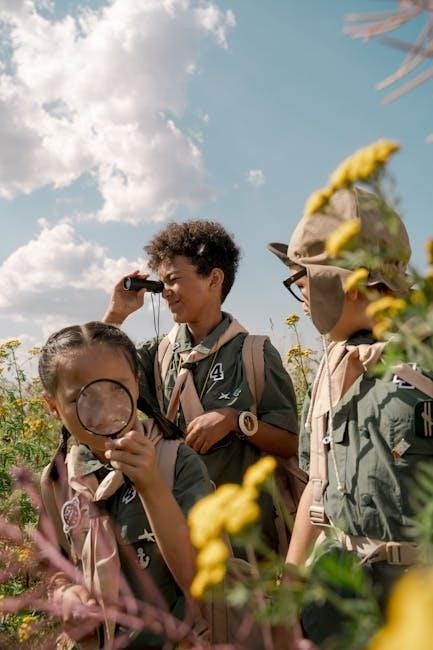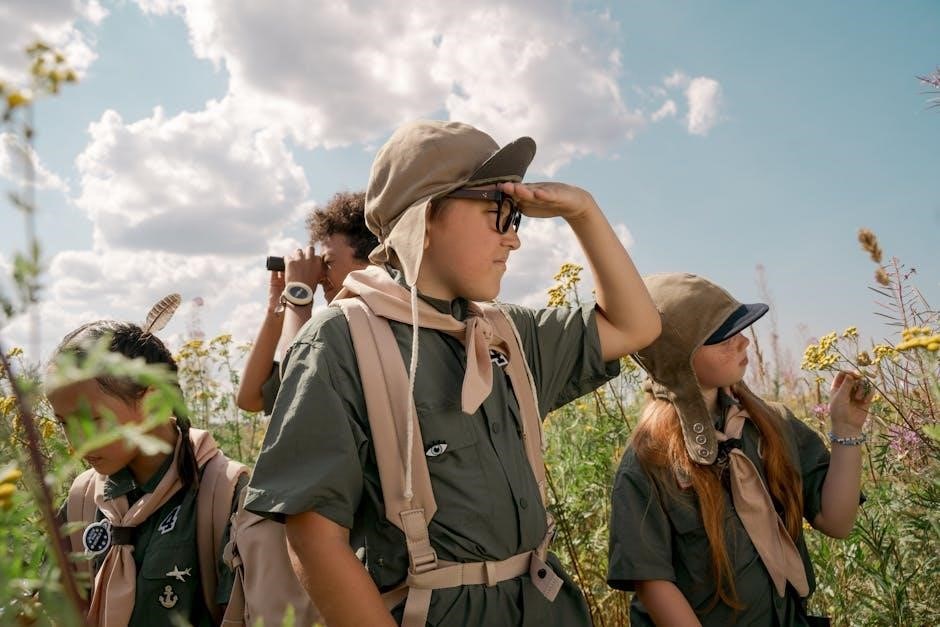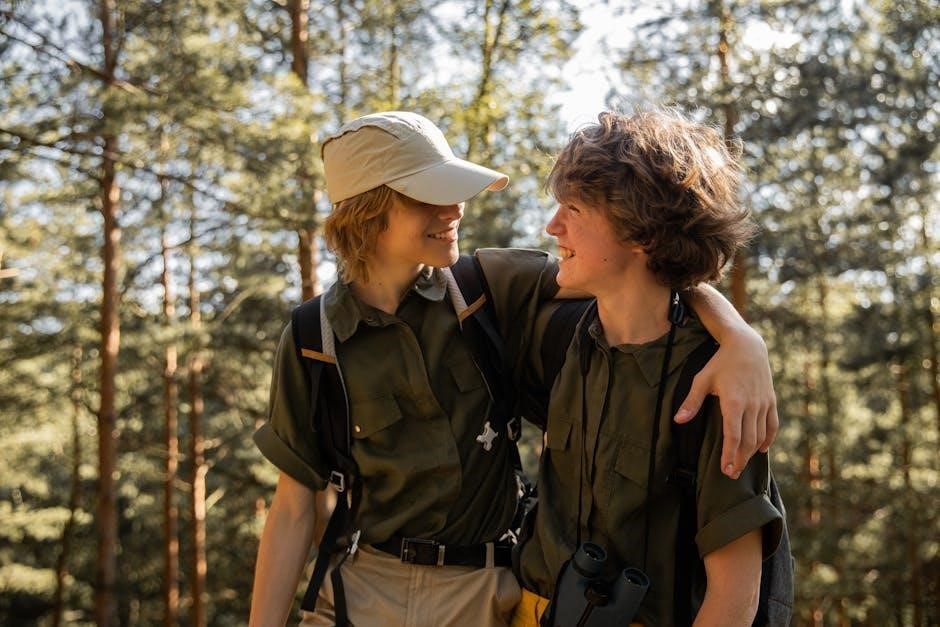The Webelos Handbook is a comprehensive guide designed to help Webelos Scouts navigate their journey through the Cub Scout program․ It provides detailed instructions, engaging activities, and essential resources for completing required and elective adventures․ The handbook emphasizes leadership, citizenship, and outdoor skills, preparing Scouts for the transition to Boy Scouts․ Leaders and parents will also find valuable tools to support Scouts in achieving their goals․ This essential resource ensures a fun and meaningful Webelos experience․
1․1 Overview of the Webelos Program
The Webelos program is a vital component of the Cub Scout experience, specifically designed for Scouts in the 4th and 5th grades․ This program serves as a bridge between the earlier Cub Scout ranks (such as Tiger, Wolf, and Bear) and the transition into Boy Scouts․ The term “Webelos” stands for “We’ll Be Loyal Scouts,” reflecting the program’s focus on loyalty, leadership, and preparation for the next stage of Scouting․

One of the unique aspects of the Webelos program is its emphasis on leadership development․ Scouts are encouraged to take on more responsibility within their den, leading activities and projects that help them build confidence and decision-making skills․ This is complemented by a strong focus on outdoor education, with many activities centered around camping, conservation, and environmental awareness․
The Webelos program is structured around activity badges, which serve as the foundation for monthly den meetings․ These badges cover a wide range of topics, from STEM-related subjects like engineering and coding to practical skills like first aid and cooking․ By earning these badges, Scouts gain a well-rounded education that prepares them for the challenges of everyday life and future Scouting adventures․
A key feature of the Webelos program is its emphasis on community service and character development․ Scouts are encouraged to participate in service projects that benefit their local communities, fostering a sense of citizenship and social responsibility․ This aligns with the broader mission of Cub Scouting, which aims to develop young people of character, prepared to make ethical and moral decisions․
The Webelos program also places a strong emphasis on teamwork and collaboration․ Scouts work together on projects and activities, learning how to communicate effectively and rely on one another․ This collaborative approach not only strengthens friendships but also helps Scouts develop essential interpersonal skills that will benefit them throughout their lives․
Outdoor activities play a central role in the Webelos program․ Camping trips, hikes, and other outdoor adventures provide Scouts with opportunities to connect with nature, challenge themselves physically, and develop a deeper appreciation for the environment․ These experiences are often highlights of the Webelos journey and serve as valuable learning opportunities․
Overall, the Webelos program is designed to be engaging, educational, and transformative․ It provides Scouts with the tools they need to succeed in Scouting and beyond, while fostering a sense of belonging and purpose․ Whether through leadership development, skill-building, or community service, the Webelos program equips young people with the confidence and character to make a positive impact in the world․
1․2 Importance of the Handbook
The Webelos handbook is an indispensable resource for both Scouts and their leaders, serving as a detailed guide to navigating the Webelos program․ It contains comprehensive information on all required and elective adventures, providing clear instructions and resources necessary for earning the Webelos badge․ The handbook is structured to help Scouts stay organized and focused as they work through their adventures, ensuring they meet all requirements efficiently․
One of the key reasons the handbook is so important is its role in facilitating structured learning․ It outlines the specific skills and knowledge Scouts need to acquire, offering practical activities and exercises that make learning engaging and fun․ For leaders, the handbook serves as a valuable tool for planning den meetings and ensuring that all Scouts are on track to achieve their goals․ It also includes tips for creating a positive and inclusive learning environment, which is crucial for the success of the program․
The handbook emphasizes the importance of safety and preparedness, particularly in outdoor activities and tool usage․ It provides detailed guidelines for Scouts to understand and apply safety protocols, ensuring that they are well-equipped to handle various situations․ This focus on safety not only builds confidence but also teaches Scouts the importance of responsibility and awareness in their daily lives․
Additionally, the handbook plays a critical role in preparing Scouts for their transition to Boy Scouts․ It introduces key concepts such as merit badges and troop meetings, helping Scouts understand what to expect as they advance in their Scouting journey․ This transition is a significant milestone, and the handbook ensures that Scouts are adequately prepared to take on new challenges with confidence․
Overall, the Webelos handbook is more than just a guide—it is a cornerstone of the Webelos program․ It provides the necessary framework for Scouts to grow, learn, and thrive, while also offering leaders the resources they need to support their dens effectively․ By following the handbook, Scouts can fully embrace the Webelos experience and make the most of their time in the program․

Structure and Content of the Webelos Handbook
The Webelos Handbook is organized into clear sections, making it easy for Scouts and leaders to navigate․ It begins with an introduction to the Webelos program, followed by detailed descriptions of required and elective adventures․ Each adventure includes specific requirements, activities, and learning objectives․ The handbook also features appendices with essential resources, such as safety guidelines, leader tips, and advancement tracking tools․ This structure ensures a comprehensive and engaging experience for Webelos Scouts as they progress through the program․
2․1 Required Adventures
The Webelos Handbook outlines a series of required adventures that every Webelos Scout must complete to earn the Webelos badge of rank․ These adventures are designed to build character, leadership skills, and a strong foundation in Scouting principles․ There are six required adventures, each focusing on a different aspect of personal growth and outdoor readiness․ The first of these is the Character & Leadership adventure, which emphasizes ethical decision-making and the importance of teamwork․ Scouts engage in activities that help them understand their role in the community and how to lead by example․
The Scouting Adventure is another core requirement, introducing Scouts to the world of Boy Scouting․ This adventure prepares them for the transition by teaching them about troop meetings, merit badges, and the patrol method․ Scouts also participate in a troop outing, giving them hands-on experience with older Scouts․ This adventure is crucial for bridging the gap between Cub Scouts and Boy Scouts․
The First Responder adventure focuses on safety and emergency preparedness․ Scouts learn basic first aid skills, such as treating wounds and recognizing medical emergencies․ They also explore the roles of firefighters, police officers, and other first responders, fostering a sense of respect for these community heroes․ This adventure equips Scouts with the knowledge to act confidently in critical situations․
The Building a Better World adventure emphasizes citizenship and community service․ Scouts participate in projects that benefit their neighborhood or environment, such as cleaning up a park or organizing a food drive․ This adventure teaches Scouts the value of giving back and working collaboratively to make a positive impact․
The Into the Wild adventure introduces Scouts to the basics of camping and outdoor survival․ They learn how to set up a tent, build a campfire, and navigate using a compass․ This adventure also includes lessons on wildlife conservation and the importance of leaving no trace when exploring nature․ Scouts gain confidence in their ability to thrive in the outdoors․
Finally, the Cooking and Camping adventure combines practical skills with fun․ Scouts learn how to prepare simple meals, use camping stoves, and plan menus for outdoor trips․ This adventure reinforces teamwork and self-reliance while encouraging Scouts to embrace the joys of camping․
These required adventures are the backbone of the Webelos program, ensuring that Scouts develop a well-rounded set of skills and values․ By completing these adventures, Webelos Scouts are fully prepared to take on new challenges and transition smoothly into the world of Boy Scouting․
2․2 Elective Adventures

Elective adventures in the Webelos program offer Scouts the opportunity to explore diverse interests and skills beyond the required adventures․ These adventures are designed to be flexible, allowing Scouts to choose activities that align with their passions and strengths․ Unlike required adventures, which focus on core Scouting principles, elective adventures provide a chance for Scouts to delve deeper into specific areas such as science, technology, arts, and the outdoors․
One popular elective adventure is Aquanaut, where Scouts learn about water safety, swimming techniques, and the importance of conservation in aquatic ecosystems․ This adventure encourages Scouts to appreciate the value of water resources and develop confidence in the water․ Another elective, Into the Woods, focuses on forestry and wildlife conservation․ Scouts learn to identify trees, understand their roles in ecosystems, and develop a deeper appreciation for nature․

The Game Design adventure introduces Scouts to the world of board games and video games, teaching them the fundamentals of game development․ This adventure fosters creativity and problem-solving skills, as Scouts design and create their own games․ Meanwhile, the Adventures in Science elective explores basic scientific principles through hands-on experiments and activities․ Scouts learn about energy, simple machines, and the scientific method, sparking their curiosity and interest in STEM fields․
Elective adventures also include options like Earth Rocks and Cast Iron Chef․ In Earth Rocks, Scouts study geology, learning about different types of rocks, minerals, and fossils; This adventure often involves field trips to collect samples and analyze geological formations․ The Cast Iron Chef adventure teaches Scouts about meal planning, food safety, and outdoor cooking techniques, preparing them for camping trips and other outdoor adventures․
These elective adventures not only enhance Scouts’ skills and knowledge but also allow them to earn additional badges, demonstrating their expertise in specific areas․ By completing elective adventures, Webelos Scouts can tailor their Scouting experience to their interests, making the program more engaging and rewarding․ The variety of elective adventures ensures that every Scout can find activities that excite them and help them grow․
